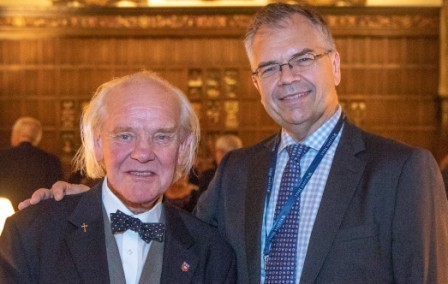[NOTE: This blog is the second of two blog posts focused on Allan Chapman and his book titled, Slaying The Dragons: Destroying Myths in the History of Science and Faith (Oxford: Lion Books, 2013).] Read Part I HERE.
A most insidious trend—and now seemingly an established fact—in Western culture is the privatization of faith. A person can believe whatever they want, but don’t bring it into the public square if it smacks in any way of religion. The irony of course, is that the public square is not neutral or devoid of worldviews. No, it simply clears the way for a secular worldview to hold sway in the public square as if it were neutral.
Christians have both been squeezed out of the public square and have voluntarily deserted it. Chapman’s view is that, “What I would suggest has happened in our own time is that Christians as a body have become too self-conscious and too defensive, and in many cases much too serious.” [224]
According to Chapman, it’s time to jump back into the debate. “Quite simply, Christians need to relearn how, in the most generous-hearted sense, to ‘give as much as they get’ and ‘Fight the Good Fight.’” [224]
He notes that, “…Christians in the twenty-first century need to have the courage to re-enter the hurly-burly of public life, and in particular the media and politics.” [225] He cites examples of those who are called and who have made a difference throughout the ages. This approach, in fact, dovetails nicely with one of the themes of the Entrepreneurial Leaders Programme, which was focused on equipping Christian leaders to be more effective difference-makers in society (see http://www.entrepreneurialleaders.com/IntrototheProgramme). I emphasized throughout our course how calling is a cornerstone to difference-making.
Chapman highlights those who had a strong sense of calling and who made a great positive difference in previous eras: Florence Nightingale, John Bunyan, William Booth and Charlese Spurgeon, to name a few.
His suggestion for having an impact: “It is essential, therefore, that Christians confidently remind the secularists and the mockers exactly what Christianity has done for the world, and the modes of thinking and acting that it has engendered.” [227] He cautions that, “Confidence, assurance, and a clear message are much more likely to inspire people and win them over than are apology and indecision.” [230]
“But centrally, Christians must always be willing—in the most generous-hearted way—to defend their faith: to challenge myths and secularist theories about history and science, missionaries, and Christianity and warfare, and to remind the world in clear, courteous, yet unequivocal terms that not all religions believe the same things, or evangelize to treat their fellow human beings the same way.” [233]
In his study of the history of science, he sees the vital role and contribution of Christians. In today’s environment, science is often used as a tool of secularists to argue that rationality and experimentation obviate the need for religion or that it can be relegated to the realm of the superstitious and outmoded.
Yet, science cannot do what it is not equipped to do. “While science answers the ‘how’ questions, religion answers the ‘why’ questions: the universe in all its dimensions works through a set of marvelous mathematical laws that the human mind has come to fathom out.” [237]
Chapman notes two positive features about the Christian tradition. First, “this all-powerful singular creator that made science possible” [239]. Second, there is “a sense of linearity and direction to creation” [239] Chapman notes that, “I would argue that it was this very precise relationship between monotheism and a beginning, a sequence of events, and an ending which made a scientific view of the world possible.” [240]
Further, why do people keep talking about meaning and significance in their individual lives? Shouldn’t people be content with meaning-less lives? Chapman notes that, “Several millennia of well-documented history have told us time and again that we humans are transcendence-seeking, worshipping beings. Humans are instinctive seekers after cause, purpose, and order.” [240]
Christians see science as in a different realm. Science describes effects, religion talks of causes and purposes. Religion deals with the why. “For try as we might not to, we humans are impelled to ask, ‘Why?” [157] “While effects constitute the legitimate world of science, what causes these effects belongs to a quite different frame of reference altogether.” [158]
Ironically, “modern science, instead of driving religious and ‘meaning’ questions out of the picture, has brought them centre stage and under the spotlight.” [164] The reality is that, “We are purpose-, origin-, meaning-, congruence-seeking beings—that, quite simply, is how our minds work.” [165]
Christianity offers meaning and significance tied to the Creator of the universe. Chapman notes that faith comes down to a key issue: can we accept transcendence? [214] Chapman concludes that, “I would argue from a purely pragmatic view, a belief in God gives us more options than does atheism.” [215]
